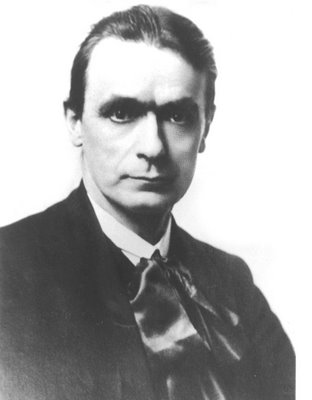RUDOLF STEINER EDUCATION

"Education is always self -education, and as teachers and educators we are merely the environment in which the child is educating himself. We have to provide the most favorable environment so that the child will be able to educate himself according to his inner destiny"
"The need for imagination, a sense of truth and a feeling of responsibility – these are the three forces which are the very nerve of education."
"Our highest endeavour must be to develop individuals who are able out of their own initiative to impart purpose and direction to their lives".
Rudolf Steiner.
What is Steiner Education?
Shearwater-The Mullumbimby Steiner School
Shearwater's growth reflects a real need in the community for a genuine educational alternative for its children. Since the inception of the Waldorf School in Stuttgart in 1919, Steiner Schools have earned an enviable reputation throughout the world as successful educators of creative, socially aware and clear minded individuals keen to take their place in, and contribute to, their community. Consequently, the Steiner School movement has become the fastest growing independent school initiative in the world, with some 900 schools and 1600 kindergartens in 50 countries, found throughout Europe, North America, Asia and Australia. Steiner inspired education seeks to develop an inner mobility and subtlety in children to help them deal with the challenges of rapidly changing social structures and technology. It strives to recognise the individuality of the child and aims to create a physical, social and spiritual environment in which that individuality can unfold with confidence. To meet these aims, Steiner education offers a broadly based learning program balancing artistic, practical and academic activities. Teachers are dedicated to generating a genuine inner enthusiasm for learning in every child through powerful, imaginative and dynamic presentation, designed to make even apparently dry and prosaic subjects interesting and relevant. This method removes the pressure for competitive testing, placing and rewards. Motivation is encouraged to come from within in a similar way to Gardner's Multiple Intelligence Theory, which was developed to allow all people to contribute to society through their own strengths.
Throughout Steiner education the perceived changes in the child's development and the crucial changes in student-teacher relationships determine the lesson content and teaching process. Rudolf Steiner repeatedly stressed that educational perpectives must 'arise from the nature of the growing child himself '
Here we see some similarities to Piaget's stages of development . Piaget realised that children were not miniature adults and that they go through four major developmental stages. The Rudolf Steiner curriculum is also based on four stages of development.
Both Piaget and Steiner emphasise the importance of play in children’s early learning (0-7). Both maintain that play enables children to develop their perceptual ability and intelligence and provides them with opportunity for socialization and experimentation with everyday reality.
Vygotsky was a contemporary of Piaget. Guided by Marxist principles, Vygostsky sociocultural theory of cognitive development focuses on how the culture of a social group, its shared beliefs, values, knowledge, skills and customs is transmitted to the next generation because children actively construct their knowledge through social interaction. Children “grow into the intellectual life of those around them”. Steiner also espoused that the range of skills that can be developed with adult guidance or peer collaboration exceeds what can be attained alone.



2 Comments:
what you've outlined is true of all Steiner schools. What makes Shearwater distinctive/ground-breaking?
Teaching guidelines for the future
Of the ten guidelines for teaching and preparing young people for the 21st Century prepared by Australian researchers Beare & Slaughter, eight refer to important features of Steiner Waldorf education:
1. Appropriate imagery - choosing metaphors with care and imagination
2. Teach for wholeness and balance - holistic paradigm;
3. Teach identification, connectedness, integration - epistemological inter-connectedness;
4. Develop individual values - value the individual;
5. Teach visualisation - development of the picturing imagination;
6. Empowerment through active hope - distinguish between faith and hope;
7. Tell stories - use story telling and mythology as powerful teaching tool; and
8. Teach and learn how to celebrate - celebrate festivals.
Or, to summarise the spirit of the above in the words of Rudolf Steiner:
The need for imagination, a sense of truth
and a feeling of responsibility ---
these are the three forces which are the very nerve of education.
Steiner education is education for life. Shearwater is but part of rich and diverse educational impulse that aims produces students who are well equipped to deal with the problems of the modern world; it also produces students who can make the best use of university learning in that they are open minded, questioning and in touch with their own creative needs."
Post a Comment
<< Home